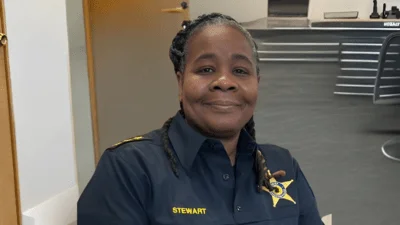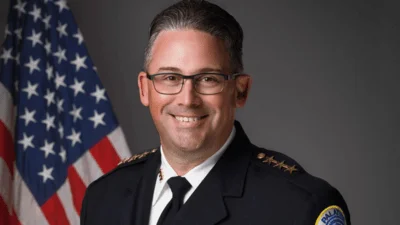Fred Crespo, Illinois State Representative from the 44th District | https://www.ilga.gov/
Fred Crespo, Illinois State Representative from the 44th District | https://www.ilga.gov/
According to the Illinois General Assembly site, the legislature summarized the bill's official text as follows: "Amends the Property Tax Code. In provisions concerning the low-income senior citizens assessment freeze homestead exemption, provides that the Chief County Assessment Officer in a county with 3,000,000 or more inhabitants may request full social security numbers or individual taxpayer identification numbers for all members of the applicant's household. Provides that the Chief County Assessment Officer may renew the low-income senior citizens assessment freeze homestead exemption without a new application if the Chief County Assessment Officer is able to confirm both that the applicant still owns and resides in the property and that applicant's household income qualifies for the exemption. Provides that a Chief County Assessment Officer who renews a low-income senior citizens assessment freeze homestead exemption without an annual application shall notify the applicant of both the decision to renew the exemption and the applicant's ongoing duty to report changes in the eligibility of the property to receive the exemption."
The following is our breakdown, based on the actual bill text, and may include interpretation to clarify its provisions.
In essence, this bill modifies the Property Tax Code regarding the low-income senior citizens assessment freeze homestead exemption. In counties with populations of 3 million or more, the Chief County Assessment Officer (CCAO) may request full social security numbers or taxpayer identification numbers from all household members applying for the exemption. The bill allows CCAOs to renew the exemption without a new application if they verify that the applicant still resides in and owns the property, and that their household income remains eligible. The CCAO must notify the applicant of the renewal and the responsibility to report any changes affecting eligibility. The bill includes provisions for verifying income eligibility without disclosing specific assistance program affiliations and maintains confidentiality of personal information.
Fred Crespo has proposed another three bills since the beginning of the 104th session.
Crespo graduated from Loyola the University of Chicago in 1980 with a BS.
Fred Crespo is currently serving in the Illinois State House, representing the state's 44th House District. He replaced previous state representative Terry R. Parke in 2007.
Bills in Illinois follow a multi-step legislative process, beginning with introduction in either the House or Senate, followed by committee review, floor debates, and votes in both chambers before reaching the governor for approval or veto. The General Assembly operates on a biennial schedule, and while typically thousands of bills are introduced each session, only a fraction successfully pass through the process to become law.
You can read more about bills and other measures here.
| Bill Number | Date Introduced | Short Description |
|---|---|---|
| HB2536 | 02/04/2025 | Amends the Property Tax Code. In provisions concerning the low-income senior citizens assessment freeze homestead exemption, provides that the Chief County Assessment Officer in a county with 3,000,000 or more inhabitants may request full social security numbers or individual taxpayer identification numbers for all members of the applicant's household. Provides that the Chief County Assessment Officer may renew the low-income senior citizens assessment freeze homestead exemption without a new application if the Chief County Assessment Officer is able to confirm both that the applicant still owns and resides in the property and that applicant's household income qualifies for the exemption. Provides that a Chief County Assessment Officer who renews a low-income senior citizens assessment freeze homestead exemption without an annual application shall notify the applicant of both the decision to renew the exemption and the applicant's ongoing duty to report changes in the eligibility of the property to receive the exemption. |
| HB1702 | 01/24/2025 | Appropriates the sum of $8,620,000 from the General Revenue Fund to the Auditor General to meet the ordinary and contingent expenses of the Office of the Auditor General. Appropriates $35,592,488 to the Auditor General from the Audit Expense Fund for administrative and operations expenses and audits, studies, investigations, and expenses related to actuarial services. Effective July 1, 2025. |
| HB1703 | 01/24/2025 | Amends the State Officials and Employees Ethics Act. Provides that an Executive Inspector General may issue a public statement when the Executive Inspector General concludes its investigation and (i) recommends systemic or procedural action based on the investigation or (ii) finds reasonable cause to believe that a violation has occurred and the Executive Inspector General believes that a complaint concerning the investigation should not be filed by the Attorney General with the Executive Ethics Commission. Limits the scope of a public statement that may be issued. Provides that, before issuing a public statement, the Executive Inspector General shall share the public statement with the agency head and ultimate jurisdictional authority affected by the investigation and allow the agency head and ultimate jurisdictional authority affected by the investigation a period of 10 business days to provide the Executive Inspector General with a response to the proposed public statement, which must be included with the public statement. Effective immediately. |
| HB1704 | 01/24/2025 | Amends the State Finance Act. Provides for the transfer of certain moneys into the Audit Expense Fund. Effective immediately |






 Alerts Sign-up
Alerts Sign-up